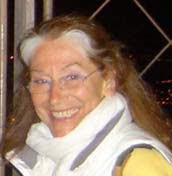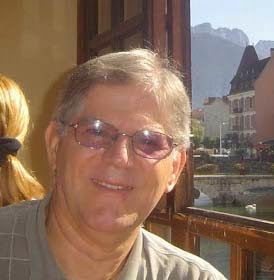 by Tom Kando
by Tom Kando
I just spent nearly three weeks in Europe. I was there for elder care. My mother is nearly 102. She recently fell, so my sisters and I had to go help out. Going back and forth across half the world is becoming increasingly tedious for me. I do this a lot, and I am exhausted, sometimes becoming sick myself from the stress and the hassles. But this isn’t what I want to write about. I am going to write about world events and my trans-Atlantic perspective on them.
I also just saw “American Sniper,” and I am struck by the contrast between the European and the American responses to (Muslim) violence. The Clint Eastwood/ Bradley Cooper film is reasonably entertaining, but its extreme popularity disturbs me. It has broken all box office records.
American patriotism and flag waving have been at an all-time high since 9-11. But it is faux patriotism: We paste ribbons on our cars and we send the professionals to fight and die. Fewer than half of one percent of us “defend freedom.” Things were different when there was a draft, as during the Vietnam war. I am not condoning the terrible way veterans were treated then. I’m just saying that back then, most Americans were not as gung-ho for war, because their own hide was at stake. Applauding at the end of “American Sniper” is easy.
Whether faux or not, many Americans are still pretty much in a fighting spirit. Europeans much less so.
During my recent visit there, the overwhelming event was the Charlie Hebdo massacre in Paris: The January 7 murder of ten journalists and two peace officers, plus the related murder of another peace officer and four Jewish citizens, for a total death toll of 19 individuals if you include the two assassins.
The media have treated this event as having arguably even greater historical significance than 9-11, which killed nearly 3,000 innocents. Charlie Hebdo has not resulted in multiple decade-long wars, as 9-11 did. However, the worldwide news coverage, the millions of marchers and the homage by world leaders gathered in Paris have elevated this event to a level unmatched by other 21st century terrorist attacks, including some which took hundreds of lives. Clearly, the event’s significance has more to do with the principles that were violated rather than a simplistic death count. Universal principles such as freedom of opinion and the media, democracy, liberte, egalite and fraternite - the sacrosanct values which emanate from no other country more than from France.
It is doubtful that the enormous and worldwide outpouring will have a lasting impact. The media and public opinion are fickle. Two weeks ago, millions marched, chanting “Je suis Charlie.” Some were bracing for a clash of civilizations, an endless confrontation between Western culture and radical Islam. On the other hand, there was also a “prise de conscience,” the idea that it is precisely such a clash which must be avoided.
And now, a few weeks later? The media and public opinion have already moved on to the next topic du jour: Deflategate. Today, the top news item is: Did super bowl-bound Tom Brady and the New England Patriots cheat in a post-season game by deflating their footballs by two pounds? Is there any hope for our mass media?
But back to Charlie Hebdo. My main point is this: What the Paris massacre demonstrates once again is that the Western opinion elite, especially in Europe, has lost the capacity for anger.
It is true of course that ever since 9-11, the West - led by the US - has done its utmost to protect itself against (Muslim) terrorism and to “fight back.” The West’s response to terrorism has been violent, often misguided (as the entire Iraq war was) and sometimes immoral (as Guantanamo is). But it was a natural and predictable response, and this is not the place to rehash our mistakes.
What strikes me the most when it comes to our response to terrorism is this: We are incessantly urged NOT to confuse psychopathic Muslim terrorism such as Al Qaeda and ISIS with Islam in general. Every time that another terrorist atrocity occurs, most of the public conversation IMMEDIATELY switches the subject from what should be the topic at hand, namely the killing of many innocent people, to that of Western Islamophobia and Western racism.
As I said, this tendency is most pronounced in (Western) Europe, although not limited to it.
This strange reaction and this immediate topic switching is what I noticed in Europe recently: I chatted on the phone with a French relative about the Charlie Hebdo event. She promptly switched to how horribly confrontational Marine Le Pen was. To remind you: Marine Le Pen is the leader of a Tea Party-like political party in France, a right-wing nativist party that is hostile to immigrants.
I had the same experience with several other European friends. A Dutch friend immediately started ranting about Geert Wilders, the Dutch equivalent of Marine Le Pen.
Another acquaintance brought up, during our conversation about the Charlie Hebdo massacre, the inhumanity of the American death penalty.
And then there were the massive “solidarity” marches and candle light vigils, and the politicians’ speeches. The mayor of Berlin addressed thousands of Germans in front of the Brandenburg Gate, to eulogize the Charlie Hebdo victims. His main theme? We must not fall prey to prejudice, bigotry, racism, xenophobia and Islamophobia. Love one another. Peace be with you. Kumbaya.
There were also the innumerable editorials arguing that the massacre had nothing to do with free speech, but that it was a response to Western prejudice, white racism and colonialism. I came across such opinions not only in Al-Jazeera (predictable) but also in the European New York Times, where the author cautioned, the day after the massacre, not to jump to conclusions and assume that the murderers were Muslims.
The knee-jerk tendency of Western opinion leaders to self-flagellate the moment the West is attacked is not new. In 1979, I became embroiled in a monumental fight with dozens of my colleagues at the university over the Iranian hostage crisis. After 52 American diplomats were taken hostage in Teheran with the blessing of Iran’s supreme leader, the Ayatollah Khomeini, I published an innocuous article urging President Carter to be firm rather than wishy-washy. Meanwhile, some of my colleagues organized a large rally on campus to “combat anti-Iranian racism in America.” I did not understand why an event that was tantamount to an act of war triggered a march in support of the nationality committing the crime...
The same thing seems to have happened again this time. What is it about the Western opinion elite, that it feels compelled to talk about past Western sins, the moment Westerners are being murdered?
Obviously, the West is guilty of past imperialism. But can’t our jabbering class, whenever another anti-western terrorist atrocity has occurred, wait a week, or at least a day or two, before returning to THAT subject matter?
Once again, after the Charlie Hebdo event, people are marching and speechifying about the sins of the West - notably Islamophobia and the maltreatment of Muslims - precisely at the moment when Muslims are committing heinous acts.
The natural reaction to aggression is anger. Have the Western elites lost the capacity for anger? Have they become cowards? Does it make sense to preach tolerance when you are under attack? Is criticizing Marine Len Pen’s nativism on the very day that immigrants murder a dozen Frenchmen
appropriate, or is it kicking the dog? Has the West become decadent?
(To be continued)
leave comment here
© Tom Kando 2015
Youtube
Contact Form
Popular Posts
-
By Madeleine Kando Flying is like signing away your rights as a human being. Not only is your life put on hold, but you never know which sid...
-
By Tom Kando Only one thing aggravates me more than the mistakes of the electorate - as exemplified by the Democratic loss in Massachusett...
-
by Madeleine Kando We left Boston early Sunday morning, the day before the 2024 Solar Eclipse. We have friends who live close to the Canadia...
-
by Tom Kando Thank you Madeleine, for your beautiful piece about Ata’s departure. I will now add my own eulogy. Just in case, here i...
Tom's Publications and Essays
Madeleine's Publications and Essays
interesting links
Publish Your Article!
A valid author name is required. We will create live links to url's that you specify in your post. Please be patient, and allow us some time to read and approve your article.We reserve the right to refuse any articles that are not deemed appropriate for this blog.
Blog Archive
-
▼
2015
(76)
-
▼
January
(7)
- Demography is Destiny - Part One
- What Animals Can Teach Us about Right and Wrong
- Charlie Hebdo and Europe’s Inability to Get Angry ...
- Charlie Hebdo and Europe’s Inability to Get Angry ...
- 'Muslims Urged to Condemn Terrorists: What Madness!'
- Do Generations Repeat Themselves?
- Our Best Wishes for the Winter Solstice
-
▼
January
(7)








